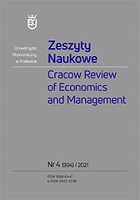Wykorzystanie metody DEA w analizie efektywności klubów piłkarskich
The Use of DEA Methodology in the Analysis of Football Club Efficiency
Author(s): Łukasz LeksowskiSubject(s): Business Economy / Management, Methodology and research technology, Sports Studies
Published by: Wydawnictwo Uniwersytetu Ekonomicznego w Krakowie
Keywords: Data Envelopment Analysis; financial performance; financial revenues; financial costs; efficiency indicator; sports performance;
Summary/Abstract: Objective: The aim of the article is twofold: to determine the efficiency of football clubs in the English league, one of the leading football leagues in the world, and to understand the usefulness of the DEA method in assessing football club efficiency. Research Design & Methods: The research was done using DEA, one of the most popular methods for assessing the efficiency of football clubs. Findings: The research and DEA method enabled a ranking of the most effective English football clubs. Leicester City, Reading, Fulham and Burnley were among the best performers, though only a single club, Manchester United, proved efficient in all of the seasons analysed. In the majority of the seasons analysed, all of the variables identified as potentially significant had a positive impact on the quality of the model used to assess efficiency. Implications/Recommendations: The combination of high revenues and good sports results achieved in international competitions make English football clubs highly efficient. In most cases, the top sports clubs are among the teams that finish highest on the performance index. Contribution: The analysis confirms the usefulness of the DEA method in the analysis of football club efficiency. It also enables the comprehensive evaluation of the functioning of English football clubs, including both their financial and sports results. Article type: original article.
Journal: Zeszyty Naukowe Uniwersytetu Ekonomicznego w Krakowie
- Issue Year: 995/2022
- Issue No: 1
- Page Range: 95-115
- Page Count: 21
- Language: Polish

